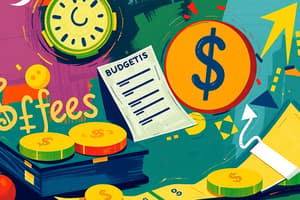Podcast
Questions and Answers
A company is determining its budget for the upcoming year. They want to be able to adjust their planned costs based on potential changes in production volume. Which type of budget would be most suitable for this company?
A company is determining its budget for the upcoming year. They want to be able to adjust their planned costs based on potential changes in production volume. Which type of budget would be most suitable for this company?
- Master budget
- Fixed budget
- Cash budget
- Flexible budget (correct)
A budget primarily serves as a qualitative guide for a business, outlining broad goals without specific monetary values.
A budget primarily serves as a qualitative guide for a business, outlining broad goals without specific monetary values.
False (B)
What is the key difference between a fixed budget and a flexible budget?
What is the key difference between a fixed budget and a flexible budget?
A fixed budget is based on one level of production capacity, while a flexible budget shows projected costs at different levels of production capacity.
A __________ budget is continuously updated by adding a new month as each current month concludes, maintaining a year-long projection.
A __________ budget is continuously updated by adding a new month as each current month concludes, maintaining a year-long projection.
Match the following budget types with their descriptions:
Match the following budget types with their descriptions:
Flashcards
Budgeting
Budgeting
The process of creating a financial plan, expressed in monetary terms.
Cash Budget
Cash Budget
A financial plan showing expected cash inflows and outflows.
Flexible Budget
Flexible Budget
A budget that adjusts to different levels of production capacity.
Rolling Budget
Rolling Budget
Signup and view all the flashcards
Master Budget
Master Budget
Signup and view all the flashcards
Study Notes
- Budgeting is the process of creating a financial budget, with the budget itself being a quantitative expression of a plan in monetary value.
- A budget indicates the amount of money required to implement the strategic and operating plans of a business.
- The budget provides clear, financially quantified directions for achieving predetermined business goals and objectives.
- A budget serves as a control mechanism for the financial activities of a business by identifying these activities in monetary terms and directing them towards achieving its objectives.
Types of Budget
- Fixed budget: Based on a single level of production capacity.
- Flexible budget: Shows projected costs at various levels of production capacity.
- Continuous or rolling budget: A one-year budget that is continuously updated monthly by adding a new month.
- Cash budget: Reflects expected cash inflows and outflows.
- Sales budget: Reflects the expected number of units to be sold, based on forecasts.
- Production budget: Shows the cost of producing the product.
- Operating budget: Reflects the sales and production budgets.
- Financial budget: Includes the cash budget and the budgeted balance sheet.
- Capital budget: A long-range budget that incorporates major expenditures for plant and machinery.
- Master budget: The overall budget of the business.
Studying That Suits You
Use AI to generate personalized quizzes and flashcards to suit your learning preferences.
Description
Explore the process of creating a financial budget. Learn how it quantifies business plans in monetary terms and guides financial activities towards achieving business objectives. Discover different types of budgets, including fixed, flexible, and cash budgets, and their specific applications.




